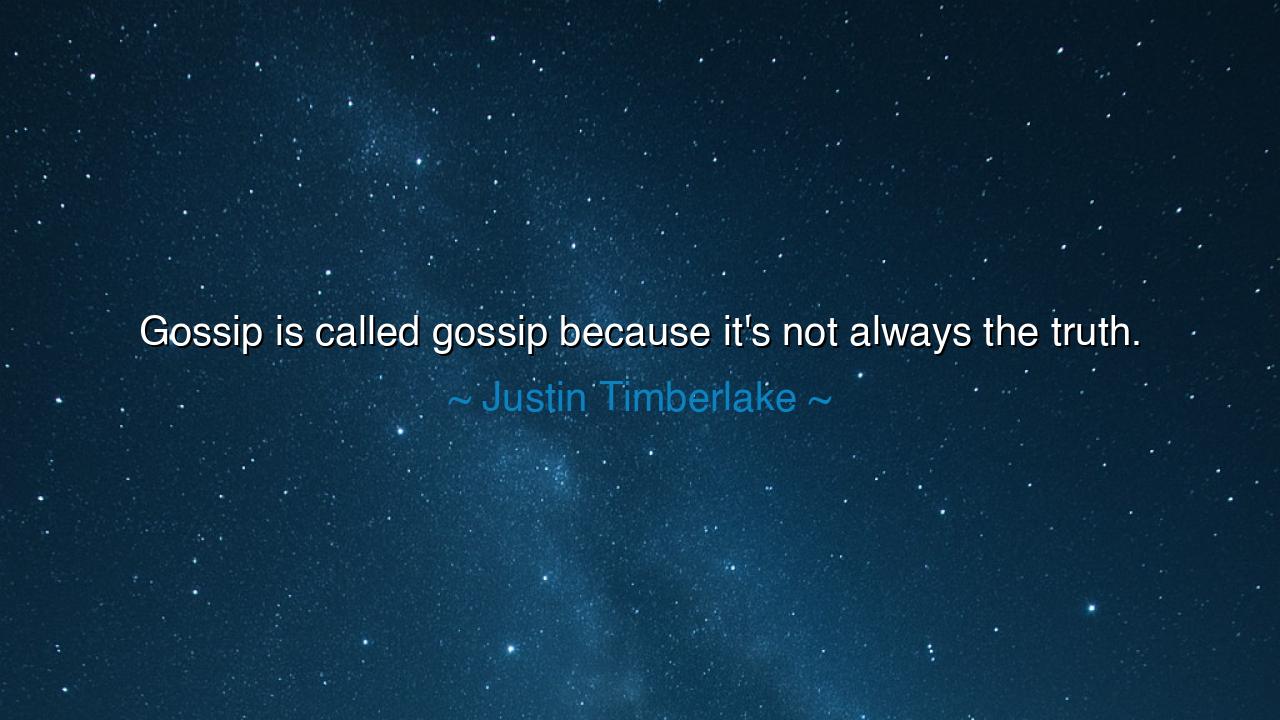
Gossip is called gossip because it's not always the truth.






"Gossip is called gossip because it's not always the truth." Thus spoke Justin Timberlake, and though the words are simple, they strike at the heart of one of humanity’s oldest snares. For gossip is not the careful telling of truth, nor the noble search for wisdom—it is the whisper that bends reality, the murmur that carries shadows rather than light. It thrives not on accuracy, but on allure; not on justice, but on curiosity and malice. And so gossip, by its very nature, is unreliable, slippery, and often dangerous.
The ancients knew this well. In the Proverbs of old it is written: “The words of a whisperer are like delicious morsels; they go down into the inner parts of the body.” The sweetness of gossip lies not in its truth, but in its novelty, its thrill. It offers the taste of secret knowledge, but that knowledge is poisoned, for it is not always the truth. And when men and women build their judgments upon such shaky foundations, they build houses upon sand, doomed to collapse.
History gives us lessons that burn. Consider the Salem witch trials of the seventeenth century. There, whispers became accusations, and accusations became deaths. The gossip of a few frightened girls, spreading tales of witchcraft, fanned into hysteria that consumed an entire town. What began as gossip—half-truths, exaggerations, outright lies—became the scaffold upon which innocents perished. Here we see with clarity: gossip is not always truth, and when mistaken for truth, it becomes destruction.
Nor has the modern age escaped this curse. Empires have fallen, reputations have been ruined, wars have been inflamed by the power of rumor. Napoleon himself once declared, "Four hostile newspapers are more to be feared than a thousand bayonets." He knew the weapon of gossip—that words, whether true or false, once spread unchecked, gain power beyond measure. And even when gossip carries fragments of truth, it is twisted in the telling, stripped of context, exaggerated until it no longer bears the likeness of reality.
The lesson here is one of vigilance. Do not mistake gossip for knowledge, nor whispers for wisdom. When you hear words spoken in secrecy about another, pause. Ask yourself: "Do I know this to be true? Do I need to repeat it? Does it build or destroy?" To pass on gossip is to become complicit in falsehood, whether or not the tale holds a seed of fact. For once the word leaves your lips, you cannot call it back. A broken reputation cannot easily be mended, and a false tale cannot easily be silenced.
Practically, this means cultivating discipline of speech. Speak what you know to be true, and only when it serves good. Refuse to carry tales that darken another’s name. Instead of spreading gossip, spread encouragement. Instead of whispering suspicion, speak openly and honestly when correction is needed. Let your words be like clean water, not stagnant pools where disease festers. In this way, you guard not only others but your own soul from the corruption of idle tongues.
So remember, children of tomorrow: gossip is called gossip because it is not always the truth. It seduces with the appearance of knowledge but deceives with emptiness. Shun it, and you will walk in clarity. Resist it, and you will protect both yourself and others. Speak truth with care, and let your words be guided not by curiosity or malice, but by justice and love. For the tongue has the power of life and death—use it to give life, never to destroy.






HPManh Huy Phan
Justin Timberlake’s quote got me thinking about how easily misinformation spreads. Gossip often thrives on speculation, and it’s easy for people to latch onto stories that are dramatic or shocking. But how does this affect the way we perceive others? Could gossip harm relationships or create false narratives that we believe to be true? It’s a reminder to be cautious with what we share, especially when we don’t have all the facts.
ATnguyen hoa anh thu
This quote resonates with the idea that gossip often stems from a place of uncertainty or misunderstanding. But why do people continue to gossip even when they know it might not be true? Is it about gaining attention or belonging? It’s interesting to think about how gossip spreads so easily, even when it lacks a solid foundation. Could we start shifting the narrative and be more intentional about sharing only what we know to be true?
KLDo Thi Khanh Linh
Timberlake’s perspective on gossip makes me question the role it plays in society. Why do we gravitate toward gossip, even when it’s not truthful? Is it because it’s easier to entertain others with juicy details than to stick to the facts? I think we need to be more aware of how gossip can hurt others, especially when it’s based on half-truths or assumptions. What would happen if we stopped engaging in gossip altogether?
HNHa Ngoc
I find it interesting how Timberlake highlights the disconnect between gossip and truth. Why is it that people are more willing to spread unverified information, often for entertainment or to feel included? Could it be that we find more excitement in a good story, even when it’s not completely accurate? I wonder if this tendency is something we could change by being more mindful about what we say and share with others.
HPHuy Pham
Justin Timberlake’s quote about gossip really makes me think about how we often blur the lines between truth and speculation. Why do we feel the need to share information that we’re not sure is true? Is it human nature to seek out drama or excitement, even at the expense of the truth? It’s interesting how gossip can take on a life of its own, even when it’s based on incomplete or false information.